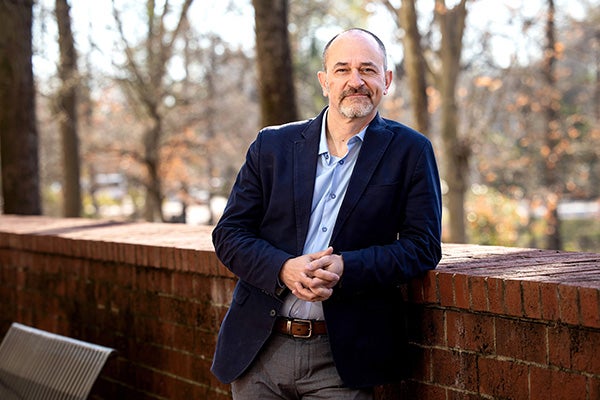Program to facilitate ECU, European research collaborations
East Carolina University’s College of Engineering and Technology will soon be collaborating with the European Union on the Next Generation Internet (NGI) Enrichers Program.
The program will bring European “internet innovators” to ECU as part of a three- to six-month fellowship to collaborate on research.
“What they are trying to do is encourage as much collaboration as possible across the Atlantic,” said Dr. Ciprian Popoviciu, assistant professor in the Department of Technology Systems who will be hosting the European fellow.
Dr. Harry Ploehn, dean of the College of Engineering and Technology, signed a memorandum of understanding that outlined the purposes of the program. The goal is to initiate and support partnerships that will enhance cooperation between European Union (EU) and North American researchers in the development of NGI technologies, services and standards. It also seeks to reinforce existing partnerships while expanding collaboration among top researchers and innovators in the evolution of the internet using a human-centric approach.

Dr. Ciprian Popoviciu, assistant professor in the Department of Technology Systems, believes East Carolina University’s participation in the NGI Enrichers Program will add to the university’s global reputation while helping provide valuable research. (Photo by Rhett Butler)
Popoviciu sees multiple ways in which the program will benefit ECU beyond the research.
“They provide visibility for ECU,” he said. “We are not just a regional university. We are not just a U.S. university. We’re an international university. We participated in a similar project last year called NGI Atlantic that included RENCI (Renaissance Computing Institute), Virginia Tech and the University of Maryland.”
That added visibility could lead more students to consider attending ECU, he said.
“I think we have an opportunity to increase our ability to attract graduate and undergraduate students who will come to do their graduate studies here from Europe,” he said. “We should raise awareness internationally on all ECU has to offer.”
Popoviciu also believes the program could lead to more study abroad opportunities for ECU students as well as the opportunity for other departments or colleges to begin their own collaborations with European researchers.
Popoviciu has been involved with the European Commission, the EU’s executive body, for about a dozen years, reviewing research proposals and the progress of funded projects.
“My work with European Commission funded programs and European research institutions provided a beachhead for this engagement,” said Popoviciu, who’s been invited to the program’s formal U.S. announcement Oct. 11-12. “They engaged us very early. We were one of the first institutions invited.”
Popoviciu’s research focuses on the Internet of Things (IoT), which describes devices, sensors or anything else with an internet connection. He led the creation of ECU’s Environmental Sensing Data Network (ESDN), which is designed to facilitate the deployment and management of sensors in support of research, education and civic projects. ESDN is operational on ECU’s main campus as well as the West Research Campus and continues to grow its footprint beyond Greenville.
“I want to expand and build out the ESDN platform and use it as the research facility for projects with European researchers,” he said. “In Europe, IoT research and enablement has seen significant advances. That will definitely be my No. 1 focus.”
He said the program is just one more positive step the university is taking as it relates to research, funding and reputation.
“It is worth it for us as a community at ECU to look beyond our typical state and federal funding mechanisms,” Popoviciu said. “The NGI Enrichers is a good example of alternatives to our usual funding sources. Hopefully other ECU researchers will reach out and look for these types of opportunities in their own fields of investigation and establish international collaborations highlighting the great talent, resources and research ECU has to offer.”